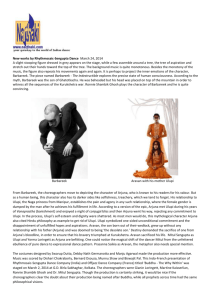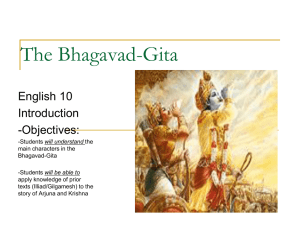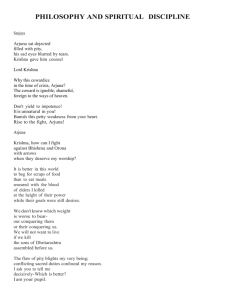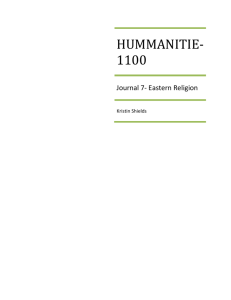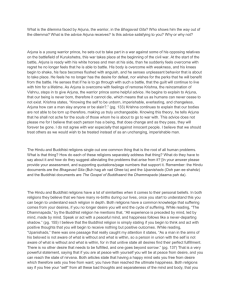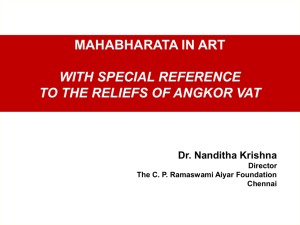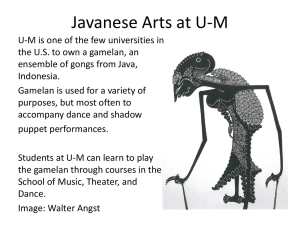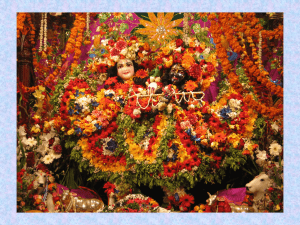- Esamskriti.com
advertisement
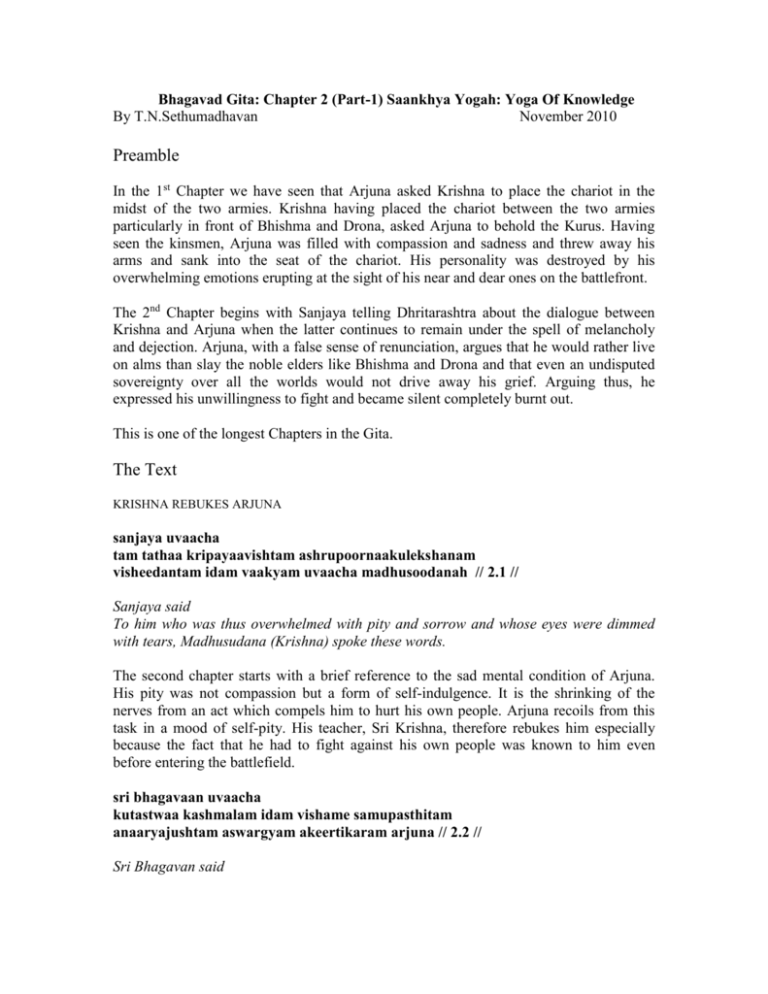
Bhagavad Gita: Chapter 2 (Part-1) Saankhya Yogah: Yoga Of Knowledge By T.N.Sethumadhavan November 2010 Preamble In the 1st Chapter we have seen that Arjuna asked Krishna to place the chariot in the midst of the two armies. Krishna having placed the chariot between the two armies particularly in front of Bhishma and Drona, asked Arjuna to behold the Kurus. Having seen the kinsmen, Arjuna was filled with compassion and sadness and threw away his arms and sank into the seat of the chariot. His personality was destroyed by his overwhelming emotions erupting at the sight of his near and dear ones on the battlefront. The 2nd Chapter begins with Sanjaya telling Dhritarashtra about the dialogue between Krishna and Arjuna when the latter continues to remain under the spell of melancholy and dejection. Arjuna, with a false sense of renunciation, argues that he would rather live on alms than slay the noble elders like Bhishma and Drona and that even an undisputed sovereignty over all the worlds would not drive away his grief. Arguing thus, he expressed his unwillingness to fight and became silent completely burnt out. This is one of the longest Chapters in the Gita. The Text KRISHNA REBUKES ARJUNA sanjaya uvaacha tam tathaa kripayaavishtam ashrupoornaakulekshanam visheedantam idam vaakyam uvaacha madhusoodanah // 2.1 // Sanjaya said To him who was thus overwhelmed with pity and sorrow and whose eyes were dimmed with tears, Madhusudana (Krishna) spoke these words. The second chapter starts with a brief reference to the sad mental condition of Arjuna. His pity was not compassion but a form of self-indulgence. It is the shrinking of the nerves from an act which compels him to hurt his own people. Arjuna recoils from this task in a mood of self-pity. His teacher, Sri Krishna, therefore rebukes him especially because the fact that he had to fight against his own people was known to him even before entering the battlefield. sri bhagavaan uvaacha kutastwaa kashmalam idam vishame samupasthitam anaaryajushtam aswargyam akeertikaram arjuna // 2.2 // Sri Bhagavan said O Arjuna, at this moment of crisis, wherefrom have you got this weakness, un-Aryan like, disgraceful and which is not conducive to the attainment of heaven? The Lord is called Bhagavan because He possesses six ‘bhagas’ or divine traits viz. wealth, virtue, glory, greatness, knowledge and dispassion. Krishna, who was silent all along, started speaking. During His very first utterance in these verses the core of the message of Gita was delivered with a tremendous force. Sri Krishna addresses him as Arjuna which means pure in heart, implying that despite this quality he became faint-hearted instead of showing valor and zeal. It is quite unbecoming of him. Krishna was surprised about this change in Arjuna. The term `Arya' refers to a highly evolved and cultured man who scrupulously adheres to Dharma. Arjuna, in whom manliness was in full all along, suddenly sunk into unmanliness at the moment of a crisis. The Lord rouses him from this set-back. Sri Krishna classified Arjuna`s mind as confused. Consequently all the utterances of such confused Arjuna would be meaningless and devoid of discrimination. Hence he is termed un-Aryan. Kirti or fame attends on the one given to laudable life on earth. But Arjuna's way was entirely to the contrary. For him who was wavering in facing a decisive moment there would be nothing but disgrace, neither this world nor the next for such confused and dejected minds. The message of Krishna is that the goal of life or success cannot be attained by the weak. To be firm in body, mind and character is born of strength. This world and the next are for the strong. Strength brings forth right conduct and straightforwardness leading to enjoyment of this world and reaching Godhood. All divine traits have their source in strength. Strength is life; weakness is death. The three words used by the Lord are ‘anaryajushtam’, ‘asvargyam’ and ‘akirtikaram’. They mean respectively three types of persons. 1. Thoughtful whose aim is to Bliss. 2. Virtuous whose aim is to achieve heaven by performing honest actions and 3. Ordinary who want name and fame in this world. Arjuna is indicted that he belongs to none of these because of his affliction. klaibyam maa sma gamah paartha naitattwayyupapadyate kshudram hridaya daurbalyam tyaktwottishtha parantapa //2.3// O Partha (Son of Pritha, Kunti), yield not to unmanliness. It does not befit you. Cast off this petty faint-heartedness and arise, O Paranthapa (scorcherer of foes - Arjuna). The man, who fails to face a critical situation, speaking and acting irrelevantly, is denounced as unmanly. But Arjuna was not really made of that stuff. He was a vanquisher of his foes. The Lord seems to have deliberately used the strongest language to make him get out of his stupor and to goad him to perform his primary duty to wage war for which he came fully prepared. The use of the words ‘Partha’ and ‘Kaunteya’ with reference to Arjuna is with a purpose. These words mean the son of Pritha, Kunti who is Krishna’s father’s sister. Krishna thus attempts to show his nearness to him and thereby convey something special to him for his welfare. ARJUNA'S DOUBTS ARE UNRESOLVED CH 2 arjuna uvaacha katham bheeshmamaham sankhye dronam cha madhusoodana ishubhih pratiyotsyaami poojaarhaav arisoodana //2.4 // Arjuna said But O Madhusudana, how can I strike Bhishma and Drona with arrows in this battle, for they are worthy of worship, O Arisudana (Destroyer of enemies - Krishna)? guroon ahatwaa hi mahaanubhaavaan shreyo bhoktum bhaikshyam apeeha loke hatwaarthakaamaamstu guroon ihaiva bhunjeeya bhogaan rudhirapradigdhaan // 2.5 // It is better to live in this world by begging than to slay these honored teachers. By slaying them I would enjoy in this world pleasures which are stained with blood. na chaitad vidmah kataran no gareeyo yad waa jayema yadi vaa no jayeyuh yaan eva hatwaa na jijeevishaamas te'vasthitaah pramukhe dhaartaraashtraah // 2.6 // I can hardly tell which will be better - to fight or not to fight, that we should conquer them or they should conquer us .The very sons of Dhritarashtra after slaying whom we do not even wish to live stand facing us. kaarpanya dosho pahata swabhaavah pricchaami twaam dharma sammoodha chetaah yacchreyah syaan nischitam broohi tanme shishyaste'ham shaadhi maam twaam prapannam // 2.7 // With my nature stricken with weakness of sentimental pity and my mind bewildered about my duty, I request you to tell me for certain what is good for me. I am your disciple. Please teach me. I am seeking refuge in you na hi prapashyaami mamaapanudyaad yacchokam ucchoshanam indriyaanaam avaapya bhoomaav asapatnam riddham raajyam suraanaam api chaadhipatyam // 2.8 // For, even after obtaining an undisputed sovereignty and an affluent kingdom on this earth and lordship over the Gods, I do not see any means of driving away this grief which is drying up my senses. Arjuna wondered as to how he was being asked to fight Bhishma and Drona, who were not his enemies but respected elders and teachers worthy of worship. When even using soft words against them was considered sin, Arjuna was surprised about his being exhorted to wage war against them with arrows. Arjuna continued that it would be better for him to eat food by begging, which was most unbecoming for a man of warrior class, than to slay his noble elders on the Kaurava side. He felt that even if they were killed, his subsequent enjoyment would be stained with their blood and therefore not worth anything and the life in this world would be nothing but hell. A question arises, why is it that Bhishma and Drona, who are not his enemies, are on the side of Duryodhana? They are there because as Arjuna says Bhishma and Drona are ‘arthakaman’, which means even though they never approved the criminal ways of Duryodhana, they still sought, accepted and enjoyed the royal hospitality of Duryodhana for so long that they now feel obligated to him so much that they simply cannot abandon Duryodhana in his time of need. That is how Bhishma and Drona are now caught on the side of Duryodhana. Arjuna feels that it is their problem and he has nothing to do with it and so he sticks to his point of view that they are worthy of his worship. He had also said that Duryodhana and his companions being goaded by greed were prepared to wage war; but for himself if he wages war, he will enjoy only blood-stained pleasure in the form of wealth and sensual enjoyment. Thus he perceives nothing but evil in waging war. When an evil comes to us in the form of an evil, it is easier to do away with it, than when it comes in the garb of something good. Ravana could not be recognized by Sita because he disguised himself as a sage while Krishna killed Kamsa and others recognizing them as evil forces. Similarly Arjuna perceives that it is virtuous not to wage war and it is an evil to wage war. Hence Krishna had to give an elaborate explanation to convince Arjuna about the real wisdom. When sentiment overtook and clouded his understanding Arjuna lost the faculty of judgment and started doubting as to who whould conquer whom? Realizing his complete helplessness in knowing the nature of his duty and admitting his incapacity to face the crisis and the challenges presented before him, he surrendered himself to Sri Krishna. He confessed before The Lord that he was his disciple and requested Him to tell him for certain what was good for him. Arjuna does not ask for a metaphysic as he is not a seeker of knowledge; as a man of action he asks for the law of action, for his dharma, for what he has to do in this difficulty. “Master, what would you have me to do?” that is his question. Arjuna made it clear that in spite of the victory in the war which will in any case bring him an affluent kingdom on this earth and lordship over the Gods, he could not see any way to drive away his grief which was eating away his vitals. He appealed to The Lord to show him a definite way which would remove his grief and guide him in his Dharma. sanjaya uvaacha evam uktwaa hrishikesham gudakeshah parantapah na yotsya iti govindam uktwaa tooshneem babhoova ha // 2.9 // Sanjaya said Having thus spoken to Hrishikesa (Krishna), Arjuna the destroyer of foes (Parantapa), said to Govinda (Krishna) I will not fight and became silent. tam uvaacha hrisheekeshah prahasanniva bhaarata senayor ubhayor madhye visheedantam idam vachah // 2.10 // O descendent of Bharata (Dhritarashtra), then Krishna, as if smiling, spoke these words to him (Arjuna) thus depressed in the midst of the two armies. Even after taking refuge in The Lord and seeking His grace, the great warrior Arjuna decidedly told Sri Bhagavan that he would not fight and became silent and quiet. Becoming silent and quiet in the face of a crisis was an expression of bewilderment and helplessness. We may notice that despite asking his teacher to advise him, Arjuna already made up his mind not to fight without even waiting for the advice sought. This indicates the confused state of his mind. In this situation the teacher’s task becomes all the more difficult to convince the student. The depiction of Arjuna as a person sorrowing in the midst of the two armies was in contrast with his description as an enthusiastic warrior ready to fight when he requested Krishna to place their chariot in between both the forces. Sri Krishna’s virtual smile indicates that He saw through Arjuna’s attempt at rationalization of his wishful thinking. The attitude of the savior Lord who knows all the sins and sorrows of the suffering humanity is one of the tender pity and thoughtful understanding and not of reproach or censure. Concepts and Issues CH 3 It would be observed from the above dialogue that Arjuna was extremely grieved, his eyes were filled with tears and his heart was overcome with sorrow, thinking of those on the battlefield and surveying both armies while the weapons were beginning to be discharged. Krishna rebuked Arjuna, the great warrior and told him to shake of all weakness. Arjuna, being of the warrior class, was obliged to fight for a righteous cause and for justice. He did not think of his kinsmen or relatives before coming to the battlefield. He was very enthusiastic and did everything to organize. He was commanding a large army. But after seeing his relatives and friends and thinking of the result of the battle, he hesitated and thought what good would come out of such a fight.. His heart filled with pity and sorrow. He became nervous and lost his head and so he wanted to retire from the battlefield at that crucial moment. Krishna said “No, that is not manliness”. Krishna found that the cause of his grief and sorrow was lack of right knowledge; it was attachment and ignorance and he tried to remove the cause of his sorrow and grief in the light of self-knowledge. It may be noted from the long statement of Arjuna that the following real issues involved were sidetracked. 1. The war was between two sets of ideals, the just and the unjust, righteousness and covetousness. 2. On the battlefield there was no individual identity like father, son, grandfather, teacher, friend etc. Each one there represented his side and the values that it stood for and it was his duty to fight for them. 3. He committed the error of looking at the problem from his personal point of view. He did not look at the situation in totality but viewed it through his colored eyeglass of egoism, the sense of `I' ness and `my' ness. 4. He saw himself attached to others: as a student of Drona, grandson of Bhishma and overlooked his duty at that critical juncture which was nothing but to fight. On the contrary although Bhishma and Drona were on the other end of that relationship which was tormenting Arjuna they did not undergo any such sentimental pangs as Arjuna did and they were ready to fire the first shot. The more one gets attached or identified with the sense of `I'ness and `my' ness the more he will be faced with problems and confusions in life. The moment he enlarges his vision and identifies himself with basic principles his confusions would disappear and he would discover his real identity with the Self. This is what Krishna's teachings will do to Arjuna. In order to have the mist cleared from his mind Arjuna at last totally surrendered before The Lord and begged him to show what was good for him. Arjuna wanted to know from Krishna what was decidedly good for him i.e. Shreyas. The term ‘good' did not mean good only for him but good to all those around him also. It also meant not only his material prosperity but spiritual enlightenment for perceiving the Reality or Self within himself. He admitted his confusion with regard to his Dharma or duty. The question in Arjuna's mind was how he should act which was expected of him or what was his Dharma. The relationship of Arjuna with Krishna had now changed from a friend to a student, from an equal to a disciple. Weighed down by wretchedness, confused about what is right and wrong, Arjuna seeks light and guidance from his teacher, the Divine by his side. When one's world is in ruins, one can only turn within and seek illumination as the gift of God's infinite compassion. It is the general experience of the seekers that they are assailed by doubts and difficulties even when they are on the threshold of light. The light as it begins to shine in any soul provokes the darkness to resist it. Arjuna faces difficulties, both inward and outward such as the resistance of the relations and friends, doubts and fears, passions and desires. They must all be laid to rest and consumed in the fire of wisdom. The struggle with the darkness will continue until the light fills one’s whole being. The conflict in Arjuna must be healed. He must attain to a new, integral, comprehensive consciousness. This frame of mind was a pre-requisite for the attainment of spiritual enlightenment. It was a turning point. The Lord took note of it, sympathized with him and infused courage in him which was the crying need of that hour. In His efforts to release Arjuna from his doubts Sri Krishna refers to the doctrine of the indestructibility of the Self, appeals to his sense of honor and martial traditions, reveals to him God's purpose and points out how action is to be undertaken in the world. We all are self-deluded men in the battlefield of this world. So long as we are in the charming and enchanting power of the world (samsara) which is nothing but maya, we do not identify anything correctly as in the case of a man identifying a rope as a snake in the inadequate light. Similarly in the partial light of our knowledge we do not know what will be the right path. So when become a disciple to a wise man, we get the proper light and then we understand the right path to Dharma. Live as the Gita Teaches You to Live Like Arjuna the aspirant must realize his weakness and ignorance and yet be anxious to do God’s will and discover what it is. So the description of the battle in the Bhagavad Gita can be applied to any one living in the world in any country at any time. We therefore study the Gita not because it was given by Sri Krishna but because it is helpful in our everyday life. In the path of everyday life, if we follow and take advice of the buddhi or intelligence and its right direction, then we can ultimately reach the goal of all religions. Sri Krishna starts by saying "O! Arjuna, you are worried unnecessarily", and ends by saying "Don't worry; I will take care of you". In between these words, there is an entire teaching on the nature of Existence - the Nature of jeeva, jagat and ishwra and the most practical philosophy for right conduct in everyday life, leading to Absolute Happiness and Total Fulfillment in life, which is indeed the teaching of all our scriptures - the Vedas and the Upanishads. From here on, we are not particularly concerned with the Mahabharata War as an episode in human history, except in terms of context. On the other hand, we are concerned with the incessant war going on within every one of us, between the forces of good and bad, in our every day life. This war is of every human being, who is mature enough to realize that Joy of Life lies only in Enlightenment of the Best and the Highest in one's own self; and that is - Self-Knowledge - God Realization. Striving towards such Enlightenment - such Self-Knowledge - such God-Realization is our heritage; is our philosophy; is our culture; is our religion. In order to gain such Enlightenment, one has to overcome so many obstacles within oneself - that is the Great War one has to fight every day of one's life. In this war itself, there is no violence. There are no bows and arrows, bombs or shells. There is no bloodshed. There is no death. There is only a continuous process of self-endeavor, to uplift oneself, which itself is a process of continuous joy. The destructive weapons of ordinary war are completely useless in this process of self endeavor. The weapons needed to succeed in this war are constructive ones, and they are: - humility, modesty, non-violence, etc., about which the Gita tells us in Chapter 13. Simply because the teachings of the Bhagavad Gita occurred in the context of the Mahabharata war, they do not constitute an incitement to violence of any kind, anywhere, at any time, under any circumstance. On the contrary, these teachings unfold the power of the all-inclusive war to dispel Self-ignorance and gain Extraordinary Enlightenment, Fulfillment and Joy of Life for every human being. Points to Ponder Arjuna’s thoughts about the impending war. How Arjuna’s decision not to wage war is incorrect? Why surrendering like Arjuna for the guidance from the wise is necessary for everybody? Sri Krishna’s expression as if smiling. Bhagavan’s strong reaction to Arjuna’s words. Next time we will proceed from the Verse 2.11 Harih Om

